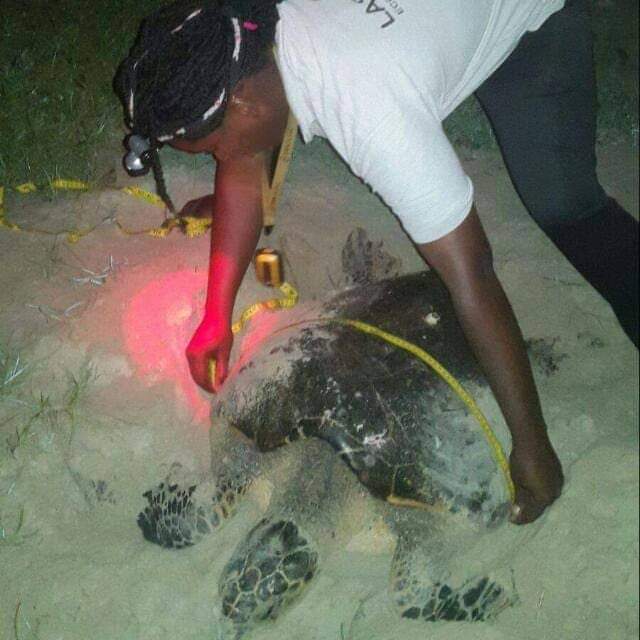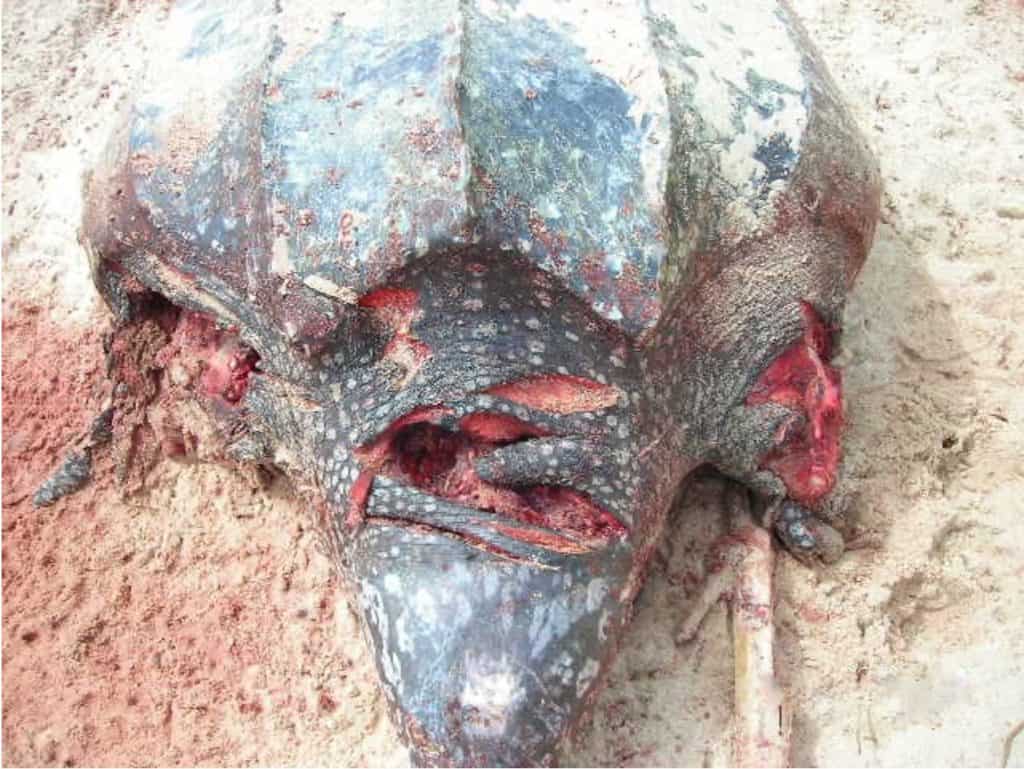Turtle conservation groups in Trinidad and Tobago are up in arms after being blocked from patrolling the nation’s beaches at night to protect nesting sea turtles. Many of the groups were hoping they would be granted special exemptions to the COVID-19 restrictions which prohibit anyone, even conservation groups, from visiting beaches outside the hours of 6 am to 6 pm.
Minister of Health, Terrance Deyalsingh, justified the government’s position at a press conference on March 8th, 2021, stating that the turtles should be sufficiently safe because, “no one is allowed on the beach to poach eggs or to kill the turtles or ride on their backs.”
However, groups such as Turtle Village Trust (TVT), Las Cuevas Eco Friendly Association, Nature Seekers and Environmental Research Institute Charlotteville (ERIC) all insist that active patrolling is still necessary to protect the Leatherback and other species as incidents of poaching increased during the 2020 season. They argue that even though turtles are known to nest at night, people intent on harming them are unlikely to be deterred by COVID-19 restrictions.
Groups ask – where is the decline?
TVT, a well-known turtle conservation umbrella group, explained the scope of the threat to Cari-Bois News, revealing that increases in poaching had been reported in Manzanilla, Fishing Pond, Las Cuevas, Blanchisuesse, Sans Souci, Grande Riviere, and Toco based on feedback they were receiving from these communities.
TVT was among a number of groups which requested exemptions to the Public Health [2019 Novel Coronavirus (2019-nCoV)] (No. 4) Regulations, which outline that beaches are to remain closed to the public from 6pm to 6am.

Arlene Williams, President of the Las Cuevas Eco Friendly Association, noted that the Las Cuevas beach, which usually has no poaching incidents for the entire nesting season, recorded eight (8) incidents of poaching in 2020. She is concerned that there may be even more this year as she believes the statement from the Minister may serve as an invitation to poachers to prey on the nesting turtles on T&T’s beaches.
There has also been an increase in reports of poaching in Tobago. This was revealed by ERIC’s President, Aljoscha Wothke, who declared that even though the Minister’s decision does not affect their current activities (they only operate during the day), there has been a significant increase in reports of poaching activities at night on the island of Tobago since 2020, when all night patrol activities were ceased.
Trinidad and Tobago’s turtle population holds global importance
Chairman of Nature Seekers, Kyle Mitchell, revealed that there was much more at stake than the lives of one or two turtles and made the following statement:
“Trinidad and Tobago is the largest nesting site for the Leatherback turtles in the Northwest Atlantic. Such global proclamations cannot be made without the data to back it up. We have a significant place in the turtle world and we need to have rigorous conservation efforts in place to determine if the population is increasing or decreasing and what interventions are required. With local data collections efforts being stalled for another consecutive year, we are not in a position to do that.”
Kyle Mitchell, Nature Seekers
In 2020, Nature Seekers received permission to conduct data collection activities on the Las Cuevas and Matura beaches in a collaborative project with Fisheries and Oceans Canada. The permission came on the backdrop of being an ‘essential partner in conservation.’ Due to further amendments to the Public Health Regulations in 2021 these provisions can no longer be made.
Community conservation groups fill a large protection gap
In a letter to the Minister of Health on March 9th, 2021, Fishermen and Friends of the Sea (FFOS), noted that communities across Trinidad and Tobago have, for decades, voluntarily engaged in nightly patrols to deter poachers. They also sought to remind the Minister that these groups often fall well below the prescribed limit of 10 persons and their visits to the beach are not for frolicking or casual ‘liming,’ but are critical for preventing the poaching and killing of these Environmentally Sensitive Species.
WARNING! Graphic image below of dead Leatherback turtle
.
.
.

In their letter, FFOS also notes that the Ministry of Planning and Development, cognizant of the gap in enforcement at the State level, established the National Sea Turtle Task Force in January 2021, bringing together State and Civil Society Organisations to advise on the protection of our marine sea turtles.
Cari-Bois was able to speak with an officer at the forestry Division under condition of anonymity who advised that there are currently less than twenty (20) game wardens responsible for the island of Trinidad. He offered the opinion that a designation of honorary game wardens from local conservation groups would render much-needed assistance in patrolling the island’s beaches.
The importance of a community presence on beaches was also highlighted by the Environmental Management Authority (EMA) in a press release on March 10th, 2021, where they indicated that a “combined strategy of community-based patrols, presence of researchers, tour guides and the public during the nesting season worked well to stave off poachers.”
There are five marine turtles that nest on Trinidad and Tobago’s shores annually, these are the Leatherback, Hawksbill, Olive Ridley, Loggerhead and the Green Turtle. In 2014 all five turtles were designated Environmentally Sensitive Species (ESS) under the ESS Rules, 2001 by the Environmental Management Authority (EMA). Under this legislation the penalty for causing damage to sea turtles is $100,000 and imprisonment for two years.
Members of the public are urged to report any poaching activities to the Trinidad and Tobago Police Service, Game Wardens of the Forestry Division and Environmental Police Unit (EPU) of the EMA.





